现代大学英语1课本翻译原题及答案
现代大学英语精读1 UNIT4 Midnight Visitor 课文翻译

2014101018第四单元Translation of Text A不速之客1 奥萨博与福勒所读过的书中关于特工的描述并不相副。
福勒很失望地跟着他一路走过阴暗的法国旅馆的走廊,在那里奥萨博租了一套房间。
那是一个位于六层的小房间,这种环境很难与这样一位传奇人物联系起来。
2 令他失望的是,首先,奥萨博是一个胖子,而且非常胖。
其次是他的口音,尽管他的法语和德语都还说的过去,但他仍然带有二十年前带到巴黎的新英格兰口音。
3 “你一定很失望”,奥萨博气喘吁吁的回过头说。
“别人说我是一个特工,一名间谍,周旋于间谍和危险之间。
你期望能见到我,因为你是一个年轻,浪漫的作家。
你本来以为今天晚上回碰见神秘人物,枪声,放在酒里的迷药。
4 “然而事情并不像你相象的那样,你在一个演奏法国音乐的餐厅同一个胖子度过了一个乏味的夜晚,而并没有黑眼睛的美女给他传递情报,只是打了个普通电话,将在他的房间里与人有个约会。
你一定已经无聊及了。
”胖男人边低声笑着边开门,并且站到一旁让他那位失望的客人进了房间。
5 “你的幻想破灭了,”奥萨博对他说。
“但是我年轻的朋友,振作起来。
一会儿你就会看到一分文件,这份相当重要的文件曾经让好几个人甘冒生命危险,送到我这儿后,我将把它转交给政府部门。
很快这份文件就很影响到历史的进程。
有点戏剧化,不是吗?”他边说,边随后关上了门。
然后打开灯。
6 当灯亮时,福勒这一天中第一次感到真正害怕了。
因为在房间的中间站着一个男人,手里拿着一只小型自动手枪。
7 奥萨博眨眨眼睛楞了一会儿。
8 “马克思”,他喘着气说,“你真让我吃惊,我以为你在柏林呢。
你在我房间里做什么?”9 马克思很单薄,个子不高,脸上的表情回让人想到狐狸。
要不是那支枪,他看上去并不是太危险。
10 “那分报告”,他低声说道。
“今天晚上将送到你手里的那分报告是有关一些新型导弹的。
我想我要把它从你受里拿走,在我手里比在你手里安全。
”11 奥萨博缓慢走到扶手椅,重重地坐在上面。
现代大学英语精读1课本内容及翻译

Lesson Eight The Kindness of StrangersMike Mclntyre1. One summer I was driving from my home town of Tahoe City, Calif, to New Orleans. In the middle of the desert, I cameupon a young man standing by the roadside. He had his thumb out and held a gas can in his other hand. I drove right by him.There was a time in the country when you' d be considered a jerk if you passed by somebody in need. Now you are a fool for helping. With gangs, drug addicts, murderers, rapists, thieves lurking everywhere, "I don't want to get involved" has become a national motto.2. Several states later I was still thinking about the hitchhiker. Leaving him stranded in the desert did not bother me so much.What bothered me was how easily I had reached the decision. I never even lifted my foot off the accelerator.3. Does anyone stop any more? I wondered. I recalled Blanche DuBois's famous line: "I have always depended on thekindness of strangers." Could anyone rely on the kindness of strangers these days? One way to test this would be for a person to journey from coast to coast without any money, relying solely on the good will of his fellow Americans. What kind of Americans would he find? Who would feed him, shelter him, carry him down the road?4. The idea intrigued me.5. The week I turned 37, I realized that I had never taken a gamble in my life. So I decided to travel from the Pacific to theAtlantic without a penny. It would be a cashless journey through the land of the almighty dollar. I would only accept offers of rides, food and a place to rest my head. My final destination would be Cape Fear in North Carolina, a symbol of all the fears I'd have to conquer during the trip.6. I rose early on September 6, 1994, and headed for the Golden Gate Bridge with a 50-pound pack on my back and a signdisplaying my destination to passing vehicles: "America."7. For six weeks I hitched 82 rides and covered 4223 miles across 14 states. As I traveled, folks were always warning meabout someplace else. In Montana they told me to watch out for the cowboys in Wyoming, In Nebraska they said people would not be as nice in Iowa. Yet I was treated with kindness everywhere I went. I was amazed by people's readiness to help a stranger, even when it seemed to run contrary to their own best interests.8. One day in Nebraska a car pulled to the road shoulder. When I reached the window, I saw two little old ladies dressed intheir Sunday finest." I know you're not supposed to pick up hitchhikers, but it's so far between towns out here, you feel bad passing a person," said the driver, who introduced herself as Vi. I didn't know whether to kiss them or scold them forstopping. This woman was telling me she'd rather risk her life than feel bad about passing a stranger on the side of the road.9. Once when I was hitchhiking unsuccessfully in the rain, a trucker pulled over, locking his brakes so hard he skidded on thegrass shoulder. The driver told me he was once robbed at knifepoint by a hitchhiker. "But I hate to see a man stand out in the rain," he added. "People don't have no heart anymore."10. I found, however, that people were generally compassionate. Hearing I had no money and would take none, people boughtme food or shared whatever they happened to have with them. Those who had the least to give often gave the most. In Oregon a house painter named Mike noted the chilly weather and asked if I had a coat. When he learned that I had "a light one," he drove me to his house, and handed me a big green army-style jacket. A lumber-mill worker named Tim invited me to a simple dinner with his family in their shabby house. Then he offered me his tent. I refused, knowing it was probably one of the family's most valuable possessions. But Tim was determined that I have it, and finally I agreed to take it.11. I was grateful to all the people I met for their rides, their food, their shelter, and their gifts. But what I found most touchingwas the fact that they all did it as a matter of course.12. One day I walked into the chamber of commerce in Jamestown, Tenn. to find out about camping in the area. The executivedirector, Baxter Wilson, 59, handed me a brochure for a local campground. Seeing that it cost $12, I replied, "No, that's all right. I'll try something else." Then he saw my backpack. "Most people around here will let you pitch a tent on their land, if that's what you want," he said. Now we're talking, I thought. "Any particular direction?" I asked. "Tell you what. I've got a big farm about ten miles south of here. If you're here at 5:30, you can ride with me."13. I accepted, and we drove out to a magnificent country house. Suddenly I realized he'd invited me to spend the night in hishome. His wife, Carol, a seventh-grade science teacher, was cooking a pot roast when we walked into the kitchen. Baxter explained that local folks were "mountain stay-at-home people" who rarely entertained in their house. "When we do," he said, "it's usually kin." This revelation made my night there all the more special.14. The next morning when I came downstairs, Carol asked if I'd come to their school and talk to her class about my trip. Iagreed, and before long had been scheduled to talk to every class in the school. The kids were attentive and kept asking all kinds of questions: Where were people the kindest? How many pairs of shoes did you have? Did anybody try to run you over? Did you fall in love with someone? What were you most afraid of?15. Although I hadn't planned it this way, I discovered that a patriotic tone ran through the talks I gave that afternoon. I told thestudents how my faith in America had been renewed. I told them how proud I was to live in a country where people were still willing to help. I told them that the question I had had in mind when I planned this journey was now clearly answered.In spite of everything, you can still depend on the kindness of strangers.第八课陌生人的仁慈1一个夏天,我正驱车从我的家乡加利福尼亚州的塔霍湖市前往新奥尔良。
现代大学英语精读1课文翻译
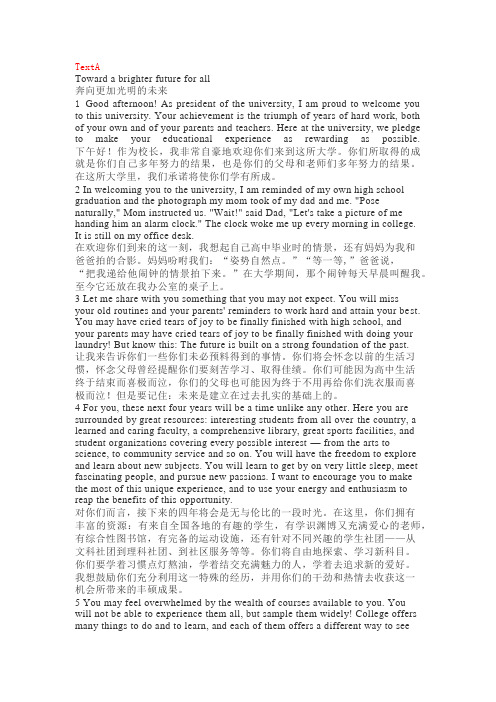
TextAToward a brighter future for all奔向更加光明的未来1 Good afternoon! As president of the university, I am proud to welcome you to this university. Your achievement is the triumph of years of hard work, both of your own and of your parents and teachers. Here at the university, we pledge to make your educational experience as rewarding as possible. 下午好!作为校长,我非常自豪地欢迎你们来到这所大学。
你们所取得的成就是你们自己多年努力的结果,也是你们的父母和老师们多年努力的结果。
在这所大学里,我们承诺将使你们学有所成。
2 In welcoming you to the university, I am reminded of my own high school graduation and the photograph my mom took of my dad and me. "Pose naturally," Mom instructed us. "Wait!" said Dad, "Let's take a picture of me handing him an alarm clock." The clock woke me up every morning in college.It is still on my office desk.在欢迎你们到来的这一刻,我想起自己高中毕业时的情景,还有妈妈为我和爸爸拍的合影。
现代大学英语精读1unit5thenightingaleandtherose课文翻译
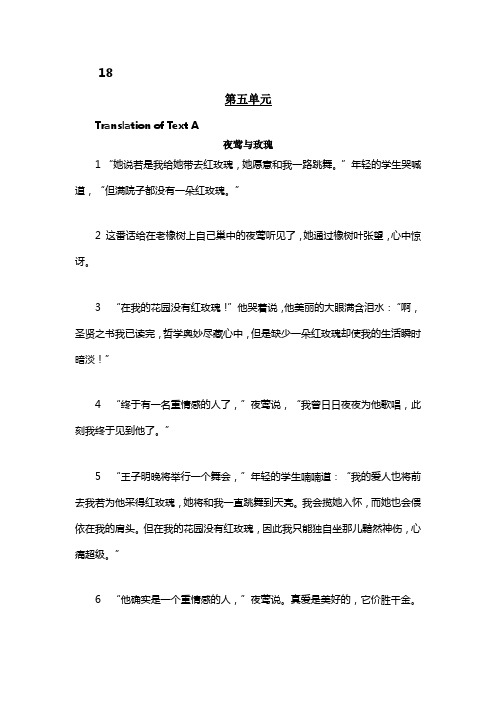
18第五单元Translation of Text A夜莺与玫瑰1 “她说若是我给她带去红玫瑰,她愿意和我一路跳舞。
”年轻的学生哭喊道,“但满院子都没有一朵红玫瑰。
”2 这番话给在老橡树上自己巢中的夜莺听见了,她通过橡树叶张望,心中惊讶。
3 “在我的花园没有红玫瑰!”他哭着说,他美丽的大眼满含泪水:“啊,圣贤之书我已读完,哲学奥妙尽藏心中,但是缺少一朵红玫瑰却使我的生活瞬时暗淡!”4 “终于有一名重情感的人了,”夜莺说,“我曾日日夜夜为他歌唱,此刻我终于见到他了。
”5 “王子明晚将举行一个舞会,”年轻的学生喃喃道:“我的爱人也将前去我若为他采得红玫瑰,她将和我一直跳舞到天亮。
我会揽她入怀,而她也会偎依在我的肩头。
但在我的花园没有红玫瑰,因此我只能独自坐那儿黯然神伤,心痛超级。
”6 “他确实是一个重情感的人,”夜莺说。
真爱是美好的,它价胜千金。
7 “乐工们将奏乐助兴,”年轻的学生道,“我的爱人将和着竖琴和小提琴声翩翩起舞。
她的身姿是如此的轻盈宛似蜻蜓点水般。
但他是不会和我一路跳的,因为我没有红玫瑰献给她。
”于是他扑倒在草地上,双手捂着脸放声痛哭起来。
8 “他为何哭泣呢?”一只绿色的蜥蜴翘着尾巴通过他身旁时问道。
9 “是啊,到底为何呢?”一只在阳光下挥动着翅膀的蝴蝶问道。
10 “到底为何呢?”一朵雏菊用低沉的声音对他的邻居说道.11 “他为一只红玫瑰哭泣。
”夜莺说。
12 “为了一朵红玫瑰?”他们叫道,“太荒谬了!”那本来就有点愤世嫉俗的小蜥蜴肆无顾忌的笑道。
可是夜莺了解男孩的悲痛,默默无声地坐在橡树上。
13 突然她张开自己棕色的双翼,向空中飞去。
她犹如影子般穿越树林,又如影子般越过花园。
14 在草地的中心一棵美丽的红玫瑰树傲然屹立。
她看到后当即向它飞去:“给我一朵红玫瑰,”她高声喊道,“我将为你献上我最甜美的歌声。
”15 可是树儿摇了摇头。
16 “我的玫瑰是白色的,”它说,“白如海之浪花,白胜高山千年积雪。
现代大学英语精读1课文翻译
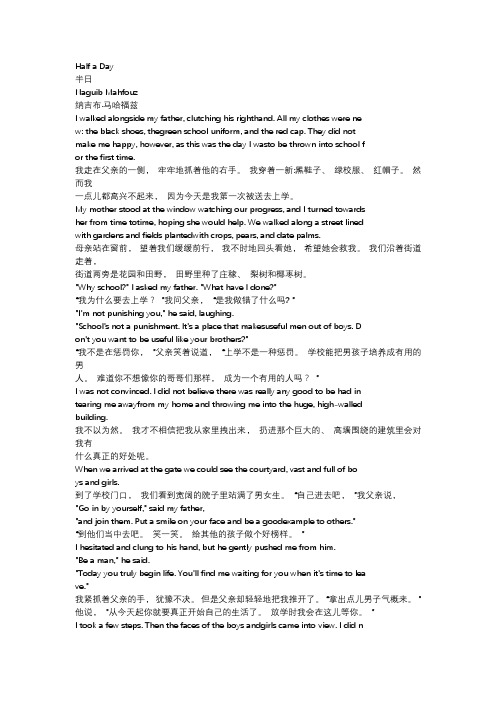
Half a Day半日Naguib Mahfouz纳吉布·马哈福兹I walked alongside my father, clutching his righthand. All my clothes were new: the black shoes, thegreen school uniform, and the red cap. They did notmake me happy, however, as this was the day I wasto be thrown into school for the first time.我走在父亲的一侧,牢牢地抓着他的右手。
我穿着一新:黑鞋子、绿校服、红帽子。
然而我一点儿都高兴不起来,因为今天是我第一次被送去上学。
My mother stood at the window watching our progress, and I turned towardsher from time totime, hoping she would help. We walked along a street linedwith gardens and fields plantedwith crops, pears, and date palms.母亲站在窗前,望着我们缓缓前行,我不时地回头看她,希望她会救我。
我们沿着街道走着,街道两旁是花园和田野,田野里种了庄稼、梨树和椰枣树。
"Why school?" I asked my father. "What have I done?"“我为什么要去上学?”我问父亲,“是我做错了什么吗? ”"I'm not punishing you," he said, laughing."School's not a punishment. It's a place that makesuseful men out of boys. Don't you want to be useful like your brothers?"“我不是在惩罚你,”父亲笑着说道,“上学不是一种惩罚。
现代大学英语1第二版5-9单元课后翻译答案
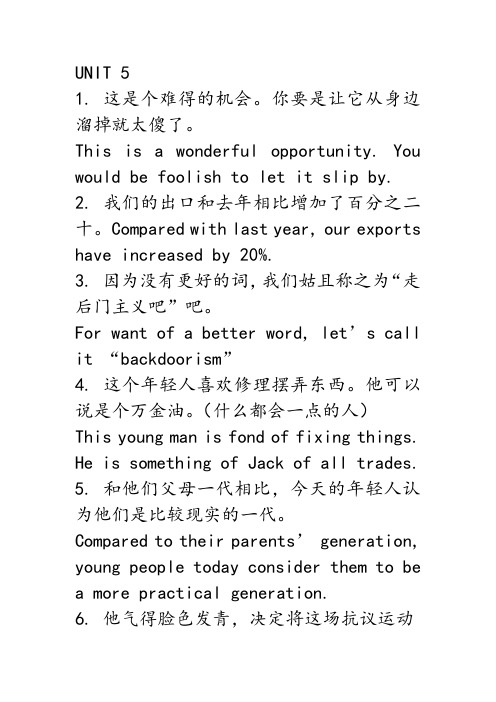
UNIT 51. 这是个难得的机会。
你要是让它从身边溜掉就太傻了。
This is a wonderful opportunity. You would be foolish to let it slip by.2. 我们的出口和去年相比增加了百分之二十。
Compared with last year, our exports have increased by 20%.3. 因为没有更好的词,我们姑且称之为“走后门主义吧”吧。
For want of a better word, let’s call it “backdoorism”4. 这个年轻人喜欢修理摆弄东西。
他可以说是个万金油。
(什么都会一点的人)This young man is fond of fixing things. Heis something of Jack of all trades.5. 和他们父母一代相比,今天的年轻人认为他们是比较现实的一代。
Compared to their parents’generation, young people today consider them to be a more practical generation.6. 他气得脸色发青,决定将这场抗议运动扼杀在萌芽状态。
His face turned/ went blue with anger. He was determined to nip the mass protest in the bud.7. 这说来话长,但是今天我不想去研究这件事的历史了。
It is a long story, but I won’t go into the history today.8.我们花了比我们想象多得多的时间才过了海关。
It took us much more time than we had expected to go through the customs.9. 灯光突然全灭了。
现代大学英语精读1课文翻译

第一单元我最初听到这个故事是在印度,那儿的人们今天讲起它来仍好像实有其事似的——尽管任何一位博物学家都知道这不可能是真的。
后来有人告诉我,在第一次世界大战之后不久就出现在一本杂志上。
但登在杂志上的那篇故事, 以及写那篇故事的人,我却一直未能找到。
故事发生在印度。
某殖民官员和他的夫人举行盛行的晚宴。
跟他们一起就座的客人有——军官和他人的夫人,另外还有一位来访的美国博物学家——筵席设在他们家宽敞的餐室里,室内大理石地板上没有铺地毯;屋顶明椽裸露;宽大的玻璃门外便是阳台。
席间,一位年轻的女士同一位少校展开了热烈的讨论。
年轻的女士认为,妇女已经有所进步,不再像过去那样一见到老鼠就吓得跳到椅子上;少校则不以为然。
“女人一遇到危急情况,”少校说,反应便是尖叫。
而男人虽然也可能想叫,但比起女人来,自制力却略胜一筹。
这多出来的一点自制力正是真正起作用的东西。
”那个美国人没有参加这场争论,他只是注视着在座的其他客人。
在他这样观察时,他发现女主人的脸上显出一种奇异的表情。
她两眼盯着正前方,脸部肌肉在微微抽搐。
她向站在座椅后面的印度男仆做了个手势,对他耳语了几句。
男仆两眼睁得大大的,迅速地离开了餐室。
在座的客人中,除了那位美国人以外论证也没有注意到这一幕,也没有看到那个男仆把一碗牛奶放在紧靠门边的阳台上。
那个美国人突然醒悟过来。
在印度,碗中的牛奶只有一个意思——引蛇的诱饵。
他意识到餐室里一定有条眼镜蛇。
他意识到餐室里一定有条眼镜蛇。
他抬头看了看屋顶上的椽子——那是最可能有蛇藏身的地方——但那上面空荡荡的。
室内的三个角落里也是空的,而在第四个角落里,仆人们正在等着下一道菜。
这样,剩下的就只有一个地方了餐桌下面。
他首先想到的是往后一跳,并向其他人发警告。
但他知道这样会引起骚乱,致使眼镜索受惊咬人。
于是他很快讲了一通话,其语气非常威严,竟使所有的人安静了下来。
我想了解一下在座的诸位到底有多大的克制能力,我数三百下——也就五分钟——你们谁都不许动一动。
大学英语(1)课后练习答案与部分课文译文
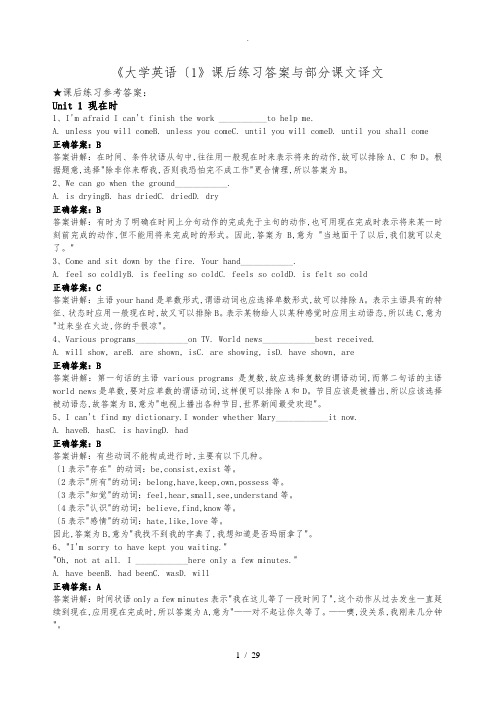
《大学英语〔1》课后练习答案与部分课文译文★课后练习参考答案:Unit 1 现在时1、I'm afraid I can't finish the work ___________to help me.A. unless you will comeB. unless you comeC. until you will comeD. until you shall come 正确答案:B答案讲解:在时间、条件状语从句中,往往用一般现在时来表示将来的动作,故可以排除A、C 和D。
根据题意,选择"除非你来帮我,否则我恐怕完不成工作"更合情理,所以答案为B。
2、We can go when the ground____________.A. is dryingB. has driedC. driedD. dry正确答案:B答案讲解:有时为了明确在时间上分句动作的完成先于主句的动作,也可用现在完成时表示将来某一时刻前完成的动作,但不能用将来完成时的形式。
因此,答案为B,意为 "当地面干了以后,我们就可以走了。
"3、Come and sit down by the fire. Your hand____________.A. feel so coldlyB. is feeling so coldC. feels so coldD. is felt so cold正确答案:C答案讲解:主语your hand是单数形式,谓语动词也应选择单数形式,故可以排除A。
表示主语具有的特征、状态时应用一般现在时,故又可以排除B。
表示某物给人以某种感觉时应用主动语态,所以选C,意为"过来坐在火边,你的手很凉"。
4、Various programs____________on TV. World news____________best received.A. will show, areB. are shown, isC. are showing, isD. have shown, are正确答案:B答案讲解:第一句话的主语various programs是复数,故应选择复数的谓语动词,而第二句话的主语world news是单数,要对应单数的谓语动词,这样便可以排除A和D。
现代大学英语精读1课本内容及翻译
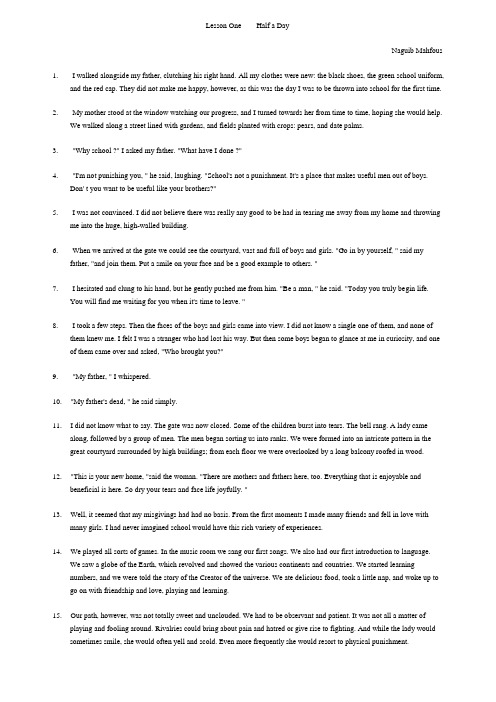
Lesson One Half a DayNaguib Mahfous1. I walked alongside my father, clutching his right hand. All my clothes were new: the black shoes, the green school uniform,and the red cap. They did not make me happy, however, as this was the day I was to be thrown into school for the first time.2. My mother stood at the window watching our progress, and I turned towards her from time to time, hoping she would help.We walked along a street lined with gardens, and fields planted with crops: pears, and date palms.3. "Why school ?" I asked my father. "What have I done ?"4. "I'm not punishing you, " he said, laughing. "School's not a punishment. It's a place that makes useful men out of boys.Don' t you want to be useful like your brothers?"5. I was not convinced. I did not believe there was really any good to be had in tearing me away from my home and throwingme into the huge, high-walled building.6. When we arrived at the gate we could see the courtyard, vast and full of boys and girls. "Go in by yourself, " said myfather, "and join them. Put a smile on your face and be a good example to others. "7. I hesitated and clung to his hand, but he gently pushed me from him. "Be a man, " he said. "Today you truly begin life.You will find me waiting for you when it's time to leave. "8. I took a few steps. Then the faces of the boys and girls came into view. I did not know a single one of them, and none ofthem knew me. I felt I was a stranger who had lost his way. But then some boys began to glance at me in curiosity, and one of them came over and asked, "Who brought you?"9. "My father, " I whispered.10. "My father's dead, " he said simply.11. I did not know what to say. The gate was now closed. Some of the children burst into tears. The bell rang. A lady camealong, followed by a group of men. The men began sorting us into ranks. We were formed into an intricate pattern in the great courtyard surrounded by high buildings; from each floor we were overlooked by a long balcony roofed in wood.12. "This is your new home, "said the woman. "There are mothers and fathers here, too. Everything that is enjoyable andbeneficial is here. So dry your tears and face life joyfully. "13. Well, it seemed that my misgivings had had no basis. From the first moments I made many friends and fell in love withmany girls. I had never imagined school would have this rich variety of experiences.14. We played all sorts of games. In the music room we sang our first songs. We also had our first introduction to language.We saw a globe of the Earth, which revolved and showed the various continents and countries. We started learningnumbers, and we were told the story of the Creator of the universe. We ate delicious food, took a little nap, and woke up to go on with friendship and love, playing and learning.15. Our path, however, was not totally sweet and unclouded. We had to be observant and patient. It was not all a matter ofplaying and fooling around. Rivalries could bring about pain and hatred or give rise to fighting. And while the lady would sometimes smile, she would often yell and scold. Even more frequently she would resort to physical punishment.16. In addition, the time for changing one' s mind was over and gone and there was no question of ever returning to theparadise of home. Nothing lay ahead of us but exertion, struggle, and perseverance. Those who were able took advantage of the opportunities for success and happiness that presented themselves.17. The bell rang, announcing the passing of the day and the end of work. The children rushed toward the gate, which wasopened again. I said goodbye to friends and sweethearts and passed through the gate. I looked around but found no trace of my father, who had promised to be there. I stepped aside to wait. When I had waited for a long time in vain, I decided to return home on my own. I walked a few steps, then came to a startled halt. Good Lord! Where was the street lined with gardens? Where had it disappeared to? When did all these cars invade it? And when did all these people come to rest on its surface? How did these hills of rubbish find their way to cover its sides? And where were the fields that bordered it? High buildings had taken over, the street was full of children, and disturbing noises shook the air. Here and there stood conjurers showing off their tricks or making snakes appear from baskets. Then there was a band announcing the opening of a circus, with clowns and weight lifters walking in front.18. Good God! I was in a daze. My head spun. I almost went crazy. How could all this have happened in half a day, betweenearly morning and sunset? I would find the answer at home with my father. But where was my home? I hurried towards the crossroads, because I remembered that I had to cross the street to reach our house, but the stream of cars would not let up.Extremely irritated, I wondered when I would be able to cross.19. I stood there a long time, until the young boy employed at the ironing shop on the corner came up to me.20. He stretched out his arm and said, "Grandpa, let me take you across."第一课半日1我走在父亲的一侧,牢牢地抓着他的右手。
现代大学英语精读1课本内容及翻译

现代大学英语精读1课本内容及翻译Lesson One Half a DayNaguib Mahfous1. I walked alongside my father, clutching his right hand. All my clothes were new: the black shoes, the green school uniform, and the red cap. They did not make me happy, however, as this was the day I was to be thrown into school for the first time.2. My mother stood at the window watching our progress, and I turned towards her from time to time, hoping she would help.We walked along a street lined with gardens, and fields planted with crops: pears, and date palms.3. "Why school ?" I asked my father. "What have I done ?"4. "I'm not punishing you, " he said, laughing. "School's nota punishment. It's a place that makes useful men out of boys.Don' t you want to be useful like your brothers?"5. I was not convinced. I did not believe there was really any good to be had in tearing me away from my home and throwing me into the huge, high-walled building.6. When we arrived at the gate we could see the courtyard, vast and full of boys and girls. "Go in by yourself, " said my father, "and join them. Put a smile on your face and be a good example to others. "7. I hesitated and clung to his hand, but he gently pushed me from him. "Be a man, " he said. "Today you truly begin life.You will find me waiting for you when it's time to leave. "8. I took a few steps. Then the faces of the boys and girls came into view. I did not know a single one of them, and none of them knew me. I felt I was a stranger who had lost his way.But then some boys began to glance at me in curiosity, and one of them came over and asked, "Who brought you?"9. "My father, " I whispered.10. "My father's dead, " he said simply.11. I did not know what to say. The gate was now closed. Some of the children burst into tears. The bell rang. A lady came along, followed by a group of men. The men began sorting us into ranks. We were formed into an intricate pattern in the great courtyard surrounded by high buildings; from each floor we were overlooked by a long balcony roofed in wood.12. "This is your new home, "said the woman. "There are mothers and fathers here, too. Everything that is enjoyable and beneficial is here. So dry your tears and face life joyfully. "13. Well, it seemed that my misgivings had had no basis. From the first moments I made many friends and fell in love with many girls. I had never imagined school would have this rich variety of experiences.14. We played all sorts of games. In the music room we sang our first songs. We also had our first introduction to language.We saw a globe of the Earth, which revolved and showed the various continents and countries. We started learning numbers, and we were told the story of the Creator of the universe. We ate delicious food, took a little nap, and woke up to go on with friendship and love, playing and learning.15. Our path, however, was not totally sweet and unclouded. We had to be observant and patient. It was not all a matter of playing and fooling around. Rivalries could bring about pain and hatred or give rise to fighting. And while the lady would sometimes smile, she would often yell and scold. Even more frequently she would resort to physical punishment.16. In addition, the time for changing one' s mind was over and gone and there was no question of ever returning to the paradise of home. Nothing lay ahead of us but exertion, struggle, and perseverance. Those who were able took advantage of the opportunities for success and happiness that presented themselves.17. The bell rang, announcing the passing of the day and the end of work. The children rushed toward the gate, which was opened again. I said goodbye to friends and sweethearts and passed through the gate. I looked around but found no trace of my father, who had promised to be there. I stepped aside to wait. When I had waited for a long time in vain, I decided to return home on my own. I walked a few steps, then came to a startled halt. Good Lord! Where was the street lined with gardens? Where had it disappeared to? When did all these cars invade it? And when did all these people come to rest on its surface? How did these hills of rubbish find their way to cover its sides? And where were the fields that bordered it? High buildings had taken over, the street was full of children, and disturbing noises shook the air. Here and there stood conjurers showing off their tricks or making snakes appear from baskets. Then there was a band announcing the opening of a circus, with clowns and weight lifters walking in front.18. Good God! I was in a daze. My head spun. I almost went crazy. How could all this have happened in half a day, between early morning and sunset? I would find the answer at home with my father. But where was my home? I hurried towards the crossroads, because I remembered that I had to cross the street to reach our house, but the stream of cars would not let up.Extremely irritated, I wondered when I would be able to cross.19. I stood there a long time, until the young boy employed at the ironing shop on the corner came up to me.20. He stretched out his arm and said, "Grandpa, let me take you across."第一课半日1我走在父亲的一侧,牢牢地抓着他的右手。
现代大学英语1课本翻译原题及答案
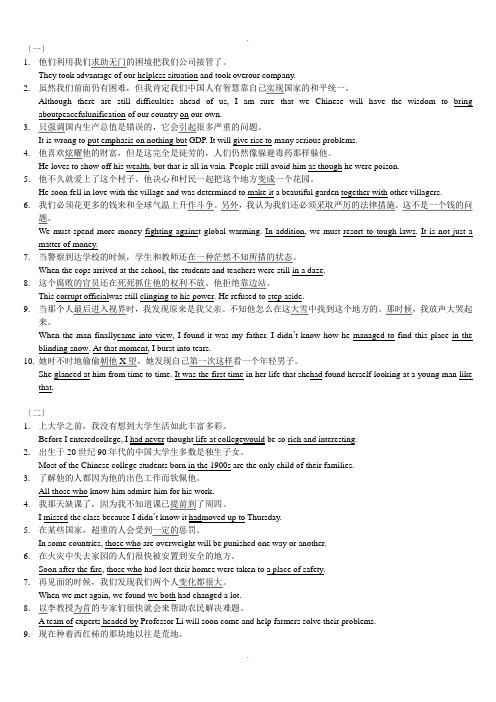
〔一〕1.他们利用我们求助无门的困境把我们公司接管了。
They took advantage of our helpless situation and took overour company.2.虽然我们前面仍有困难,但我肯定我们中国人有智慧靠自己实现国家的和平统一。
Although there are still difficulties ahead of us, I am sure that we Chinese will have the wisdom to bring aboutpeacefulunification of our country on our own.3.只强调国内生产总值是错误的,它会引起很多严重的问题。
It is wrong to put emphasis on nothing but GDP. It will give rise to many serious problems.4.他喜欢炫耀他的财富,但是这完全是徒劳的,人们仍然像躲避毒药那样躲他。
He loves to show off his wealth, but that is all in vain. People still avoid him as though he were poison.5.他不久就爱上了这个村子。
他决心和村民一起把这个地方变成一个花园。
He soon fell in love with the village and was determined to make it a beautiful garden together with other villagers.6.我们必须花更多的钱来和全球气温上升作斗争。
另外,我认为我们还必须采取严厉的法律措施。
这不是一个钱的问题。
We must spend more money fighting against global warming. In addition, we must resort to tough laws. It is not just a matter of money.7.当警察到达学校的时候,学生和教师还在一种茫然不知所措的状态。
现代大学英语精读1(第二版)1-10单元课文翻译
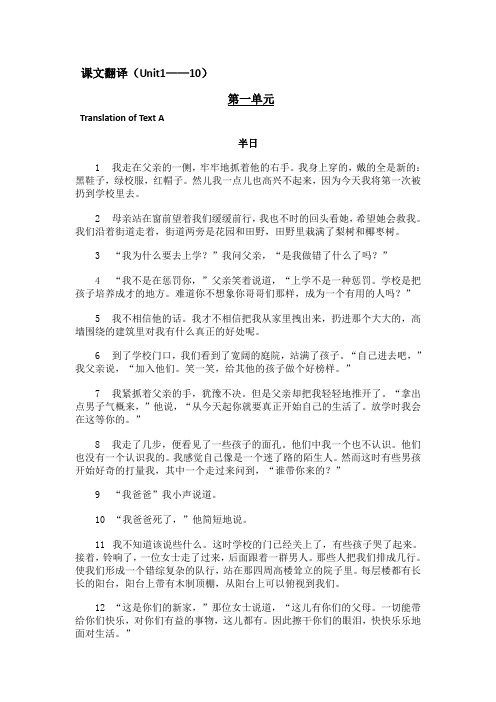
课文翻译(Unit1——10)第一单元Translation of Text A半日1我走在父亲的一侧,牢牢地抓着他的右手。
我身上穿的,戴的全是新的:黑鞋子,绿校服,红帽子。
然儿我一点儿也高兴不起来,因为今天我将第一次被扔到学校里去。
2母亲站在窗前望着我们缓缓前行,我也不时的回头看她,希望她会救我。
我们沿着街道走着,街道两旁是花园和田野,田野里栽满了梨树和椰枣树。
3“我为什么要去上学?”我问父亲,“是我做错了什么了吗?”4“我不是在惩罚你,”父亲笑着说道,“上学不是一种惩罚。
学校是把孩子培养成才的地方。
难道你不想象你哥哥们那样,成为一个有用的人吗?”5我不相信他的话。
我才不相信把我从家里拽出来,扔进那个大大的,高墙围绕的建筑里对我有什么真正的好处呢。
6到了学校门口,我们看到了宽阔的庭院,站满了孩子。
“自己进去吧,”我父亲说,“加入他们。
笑一笑,给其他的孩子做个好榜样。
”7我紧抓着父亲的手,犹豫不决。
但是父亲却把我轻轻地推开了。
“拿出点男子气概来,”他说,“从今天起你就要真正开始自己的生活了。
放学时我会在这等你的。
”8我走了几步,便看见了一些孩子的面孔。
他们中我一个也不认识。
他们也没有一个认识我的。
我感觉自己像是一个迷了路的陌生人。
然而这时有些男孩开始好奇的打量我,其中一个走过来问到,“谁带你来的?”9“我爸爸”我小声说道。
10“我爸爸死了,”他简短地说。
11我不知道该说些什么。
这时学校的门已经关上了,有些孩子哭了起来。
接着,铃响了,一位女士走了过来,后面跟着一群男人。
那些人把我们排成几行。
使我们形成一个错综复杂的队行,站在那四周高楼耸立的院子里。
每层楼都有长长的阳台,阳台上带有木制顶棚,从阳台上可以俯视到我们。
12“这是你们的新家,”那位女士说道,“这儿有你们的父母。
一切能带给你们快乐,对你们有益的事物,这儿都有。
因此擦干你们的眼泪,快快乐乐地面对生活。
”13这样看来我之前的顾虑都是毫无根据的了。
现代大学英语精读1(带译文)

现代大学英语精读1(带译文)一、课文背景本单元选自美国作家埃德加·爱伦·坡的短篇小说《黑猫》。
故事讲述了一位酗酒成性的男子,因虐待并杀害自己收养的黑猫,最终被黑猫的鬼魂复仇,自己也在精神崩溃中走向毁灭。
这篇小说通过恐怖、悬疑的情节,揭示了人性的黑暗面和道德的沦丧。
二、课文概要1. 故事发生在美国一个偏远的农场,主人公是一位酗酒成性的男子。
他收养了一只黑猫,取名普卢托。
随着时间的推移,他对黑猫产生了强烈的依赖,甚至将它视为自己的朋友。
2. 有一天,男子在醉酒后用刀划伤了普卢托的左眼。
酒醒后,他为自己的行为感到愧疚,但为了掩盖罪行,他决定将黑猫埋在院子里。
3. 在黑猫被埋葬的当晚,男子听到了黑猫的哀嚎声。
他开始怀疑自己的行为,精神状态逐渐恶化。
4. 为了摆脱黑猫的纠缠,男子决定离开农场,搬到城里居住。
然而,他发现黑猫的鬼魂无处不在,甚至出现在他的新家中。
5. 最终,男子在精神崩溃中走向毁灭,被黑猫的鬼魂复仇。
三、课文难点解析1. 生词短语(1)酗酒成性:drunkard,意为“酒鬼”。
(2)虐待:torture,意为“折磨”。
(3)复仇:revenge,意为“报复”。
2. 句子结构(1)It was in the early part of the evening that I first became aware of the symptoms of my little trouble.本句中,It wasthat为强调句型,强调时间状语“in the early part of the evening”。
symptoms意为“症状”,指男子开始意识到自己的精神状态出现问题。
(2)I resolved to get rid of the cat at once.本句中,resolve to do sth. 意为“决定做某事”,get rid of意为“摆脱”。
男子决定立刻摆脱黑猫。
现代大学英语精读1(第二版)1-9课文翻译
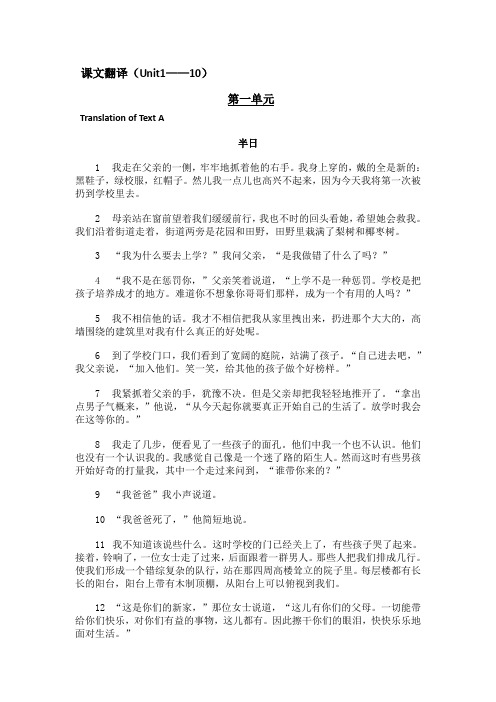
课文翻译(Unit1——10)第一单元Translation of Text A半日1我走在父亲的一侧,牢牢地抓着他的右手。
我身上穿的,戴的全是新的:黑鞋子,绿校服,红帽子。
然儿我一点儿也高兴不起来,因为今天我将第一次被扔到学校里去。
2母亲站在窗前望着我们缓缓前行,我也不时的回头看她,希望她会救我。
我们沿着街道走着,街道两旁是花园和田野,田野里栽满了梨树和椰枣树。
3“我为什么要去上学?”我问父亲,“是我做错了什么了吗?”4“我不是在惩罚你,”父亲笑着说道,“上学不是一种惩罚。
学校是把孩子培养成才的地方。
难道你不想象你哥哥们那样,成为一个有用的人吗?”5我不相信他的话。
我才不相信把我从家里拽出来,扔进那个大大的,高墙围绕的建筑里对我有什么真正的好处呢。
6到了学校门口,我们看到了宽阔的庭院,站满了孩子。
“自己进去吧,”我父亲说,“加入他们。
笑一笑,给其他的孩子做个好榜样。
”7我紧抓着父亲的手,犹豫不决。
但是父亲却把我轻轻地推开了。
“拿出点男子气概来,”他说,“从今天起你就要真正开始自己的生活了。
放学时我会在这等你的。
”8我走了几步,便看见了一些孩子的面孔。
他们中我一个也不认识。
他们也没有一个认识我的。
我感觉自己像是一个迷了路的陌生人。
然而这时有些男孩开始好奇的打量我,其中一个走过来问到,“谁带你来的?”9“我爸爸”我小声说道。
10“我爸爸死了,”他简短地说。
11我不知道该说些什么。
这时学校的门已经关上了,有些孩子哭了起来。
接着,铃响了,一位女士走了过来,后面跟着一群男人。
那些人把我们排成几行。
使我们形成一个错综复杂的队行,站在那四周高楼耸立的院子里。
每层楼都有长长的阳台,阳台上带有木制顶棚,从阳台上可以俯视到我们。
12“这是你们的新家,”那位女士说道,“这儿有你们的父母。
一切能带给你们快乐,对你们有益的事物,这儿都有。
因此擦干你们的眼泪,快快乐乐地面对生活。
”13这样看来我之前的顾虑都是毫无根据的了。
现代大学英语精读1u11课文翻译
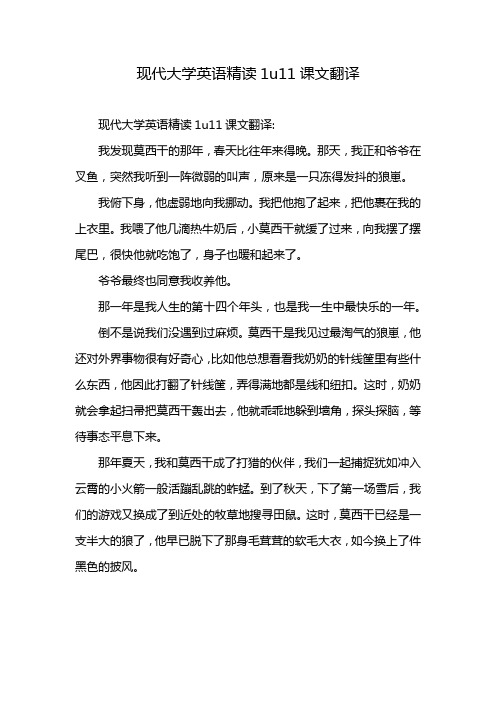
现代大学英语精读1u11课文翻译现代大学英语精读1u11课文翻译:我发现莫西干的那年,春天比往年来得晚。
那天,我正和爷爷在叉鱼,突然我听到一阵微弱的叫声,原来是一只冻得发抖的狼崽。
我俯下身,他虚弱地向我挪动。
我把他抱了起来,把他裹在我的上衣里。
我喂了他几滴热牛奶后,小莫西干就缓了过来,向我摆了摆尾巴,很快他就吃饱了,身子也暖和起来了。
爷爷最终也同意我收养他。
那一年是我人生的第十四个年头,也是我一生中最快乐的一年。
倒不是说我们没遇到过麻烦。
莫西干是我见过最淘气的狼崽,他还对外界事物很有好奇心,比如他总想看看我奶奶的针线筐里有些什么东西,他因此打翻了针线筐,弄得满地都是线和纽扣。
这时,奶奶就会拿起扫帚把莫西干轰出去,他就乖乖地躲到墙角,探头探脑,等待事态平息下来。
那年夏天,我和莫西干成了打猎的伙伴,我们一起捕捉犹如冲入云霄的小火箭一般活蹦乱跳的蚱蜢。
到了秋天,下了第一场雪后,我们的游戏又换成了到近处的牧草地搜寻田鼠。
这时,莫西干已经是一支半大的狼了,他早已脱下了那身毛茸茸的软毛大衣,如今换上了件黑色的披风。
冬天很快到来,那几个月是我记忆中最快乐的日子,这是完全属于我与莫西干的美好时光。
我们常常在灌木丛里点起一堆篝火,莫西干的头伏在两个前爪之间,凝视着我,听我给他讲故事。
这一切使我快乐的忘乎所以了,结果一天晚上我把爷爷的再三嘱咐跑到了脑后,没有把莫西干拴起来。
第二天早上,叶斯诺太太气冲冲地找上门来,坚持要把莫西干给毙了,原来他夜里咬死了人家的公鸡。
第三天早上,爷爷说要把莫西干带到北边的猎棚里。
等我们来到猎棚附近的湖边时,莫西干似乎变得躁动起来。
他常常坐在湖边,鼻子冲天,头转来转去,似乎在探测风向。
屋里暖烘烘的炉火使我很快就睡着了,后来不知是怎么回事,我忽然激灵一下醒了过来,我坐起身来,此时屋里洒满月光,爷爷站在我身边。
“孩子,快过来看,”爷爷小声对我说。
外面是一轮满月,雪中的世界一片银白,他指了指湖边耸立的一块岩石,岩石最高处可以清晰地看到一只大狼的身影,它坐在那里一动不动,两耳竖起,警觉地听着什么。
现代大学英语1课本翻译原题与答案
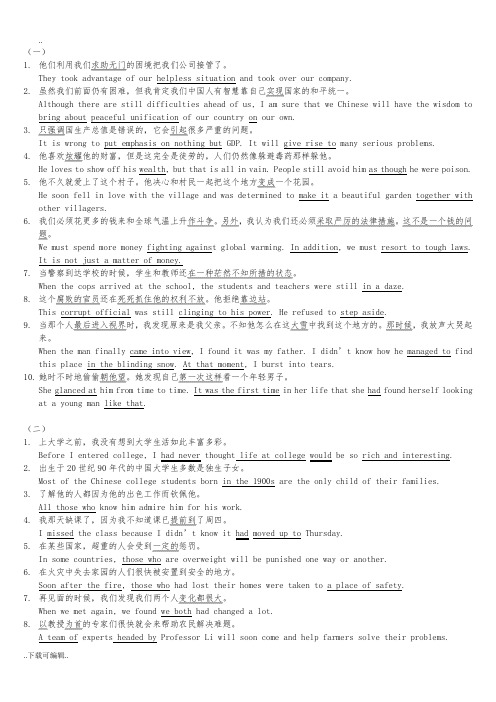
(一)1.他们利用我们求助无门的困境把我们公司接管了。
They took advantage of our helpless situation and took over our company.2.虽然我们前面仍有困难,但我肯定我们中国人有智慧靠自己实现国家的和平统一。
Although there are still difficulties ahead of us, I am sure that we Chinese will have the wisdom to bring about peaceful unification of our country on our own.3.只强调国生产总值是错误的,它会引起很多严重的问题。
It is wrong to put emphasis on nothing but GDP. It will give rise to many serious problems.4.他喜欢炫耀他的财富,但是这完全是徒劳的,人们仍然像躲避毒药那样躲他。
He loves to show off his wealth, but that is all in vain. People still avoid him as though he were poison.5.他不久就爱上了这个村子。
他决心和村民一起把这个地方变成一个花园。
He soon fell in love with the village and was determined to make it a beautiful garden together with other villagers.6.我们必须花更多的钱来和全球气温上升作斗争。
另外,我认为我们还必须采取严厉的法律措施。
这不是一个钱的问题。
We must spend more money fighting against global warming. In addition, we must resort to tough laws.It is not just a matter of money.7.当警察到达学校的时候,学生和教师还在一种茫然不知所措的状态。
现代大学英语第一册unit8——unit13翻译答案
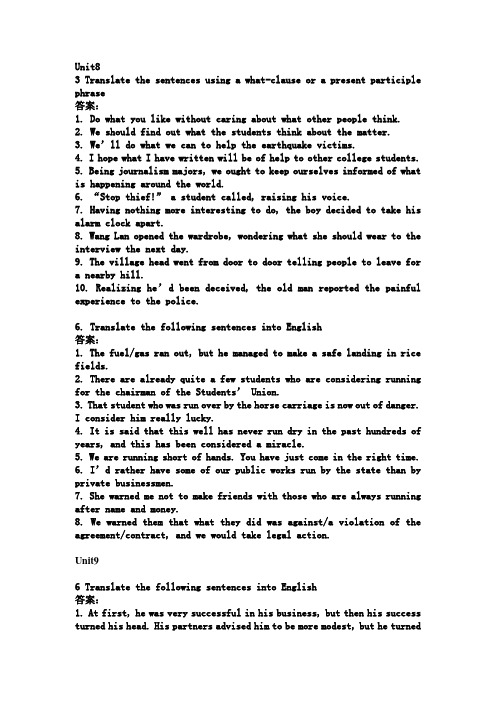
Unit83 Translate the sentences using a what-clause or a present participle phrase答案:1. Do what you like without caring about what other people think.2. We should find out what the students think about the matter.3. We’ll do what we can to help the earthquake victims.4. I hope what I have written will be of help to other college students.5. Being journalism majors, we ought to keep ourselves informed of what is happening around the world.6. “Stop thief!” a student called, raising his voice.7. Having nothing more interesting to do, the boy decided to take his alarm clock apart.8. Wang Lan opened the wardrobe, wondering what she should wear to the interview the next day.9. The village head went from door to door telling people to leave fora nearby hill.10. Realizing he’d been deceived, the old man reported the painful experience to the police.6. Translate the following sentences into English答案:1. The fuel/gas ran out, but he managed to make a safe landing in rice fields.2. There are already quite a few students who are considering running for the chairman of the Students’ Union.3. That student who was run over by the horse carriage is now out of danger.I consider him really lucky.4. It is said that this well has never run dry in the past hundreds of years, and this has been considered a miracle.5. We are running short of hands. You have just come in the right time.6. I’d rather have some of our public works run by the state than by private businessmen.7. She warned me not to make friends with those who are always running after name and money.8. We warned them that what they did was against/a violation of the agreement/contract, and we would take legal action.Unit96 Translate the following sentences into English答案:1. At first, he was very successful in his business, but then his success turned his head. His partners advised him to be more modest, but he turneda deaf ear to their advice.2. Jingke was very confident/sure that when he unfolded the map he would be able to kill the Emperor of Qin with the sharp knife/dagger hidden in it.3. We ought to welcome more and more wealthy people, but our law must make sure that they have made their fortune in honest ways.4. For years our school has produced many good students, most of whom have important positions in various departments.5. Due to cultural differences many foreigners are turned off at the sight of dog meat or cat meat.6. Whenever you have time, turn it over in your mind, will you?7. She used to consider philosophy dull and boring, but later she found that it turned out to be very interesting.8. His father had just turned fifty, and his hair has turned gray, but otherwise, he is quite all right.9. The power of government officials must be checked and balanced. Otherwise those who are supposed to be people’s servants will turn into people’s masters.10. He believed that it was worth trying because he knew that whatever you do, you must have people’s support.3 Translate the following sentences, using a conditional clause …答案1. Wherever he goes, he is recognized.2. No matter how hard I try, I can’t persuade him to play the part of Hamlet.3. No matter what you have planned for the future, your parents will support you.4. The boy hates crime and means to stop it whenever he can.5. No matter what you decide in the end, this digital dictionary is yours to keep for a semester.6. No matter how capable and efficient you are, you cannot finish the task on your own in three days.7. A well-known philosopher once said, ‘ I eat and drink whatever I like, and sleep whenever I cannot keep awake. I am in good health.’8.I wish I could go and see my parents whenever I want.9. I wish I could express openly whatever I feel.10. I’ll do whatever I can to restore law and order in the region. ButI wish the riot had never happened.Unit106. Translate the following sentences into English答案:1. 如果他们拒绝归还小岛,他们两国的关系就不能完全正常化。
现代大学英语Lesson1翻译

现代大学英语Lesson1翻译现代大学英语Lesson1翻译The Edge--Kathleen Louise SmileyThe night before I left for Israel was spent in the same kind of conversations that had filled the previous week. "But why Israel?" my father would ask, in the same tone he used when he asked "Why China?" or "Why Russia?" or "why" any other country I had announced I wanted to visit. "There's war over there, you know," he would add. "Yes, Dad, I know. There are wars everywhere," I would answer. He would ask why I insisted on going to such dangerous places. Finally, I would hear the words I've heard all my life: "Well, you've never listened to me before. Why should I think you'd listen now?" In typical fashion, he would close his eyes, heave a long sigh and shake his head.When these "discussions" took place, my sister, Kristy, would always try to diffuse the tension. Although she realized long ago that it would never work, she' d try just the same. "Kath, " she' d suggest, "why don' t you go to England for summer school. It's not dangerous there. " But as always, she didn't understand. None of my family has ever reallyunderstood me. I've never fit my family' s idea of the way I should live my life. England was not exciting enough. I wanted to go somewhere and experience something different. My soul has always been restless to venture into unknown places. My mother has always said that I have "gypsy" in my blood.My sister and I are three and a half years apart in age, but a world apart in the way we live our lives. She is conservative and quiet. I take too many risks, and the only time I'm really quiet is when I'm asleep. I've spent most of my adult life apologizing tomy sister and the rest of my family for being different, for embarrassing them by something I wear, something I do or something I say.Since my sister is so different from me—or since I' m so different from her—we aren't very close. The older we get, the busier we become, and the less we see of each other, even though we live only half a mile apart. When we do get together, I feel that she's holding her breath and waiting for me to do or say something "wrong" while I'm walking on eggshells and praying that I don't. But inevitably, I do.Because my sister seemed the least upset with my summer plans, I humbly asked her for a ride to the airport. "No problem, " she said casually, "but don't tell Dad! " I smiled and agreed. It's not that our father is some kind of tyrant. We know that he loves us very much; that's evident from all the sacrifices he has made for us. I would not have gone to law school if it weren't for him. He's just worried and has a hard time separating his worry from his love.On the way to the airport the next day, my sister was quiet as usual. But for the first time since I'd decided to go, she started asking questions about my trip: where I was planning to travel, where I was going to stay. She seemed truly interested.My family is not big on emotional goodbyes, so with a "have a good time" and a quick "love you too, " my sister was gone. I was sad because I felt she just couldn't understand. I wished at that moment that she could come with me, but I knew she wouldn't.I checked in, took my seat and started to get organized. I glanced inside my bag which my sister had loaded in the trunk before we left for the airport. There, along with my passport,traveler's checks and other important items, was a small white envelope with "Kath" written on it in my sister's handwriting. I opened the envelope and found a bon voyage card. It was a lighthearted, funny card with a cartoon on the front. Most cards my family members give are funny cards, and this was no different—or so I thought.When I opened the card and read what was inside, I realized that my sister—who I had decided just couldn't understand—actually did understand. It seemed there was a small part of her that wished she were me, maybe a small part of her that always had wished she were me. The card was blank except for what my sister had written:I really admire you for experiencing life in such a full way.I love you.Your sister,Kristy锋芒---凯瑟琳.路易丝史密里在我去以色列的前一天晚上,我与父亲进行了一场对话,同样的对话贯穿了整个上周。
现代大学英语精读1_第二版_第三单元课文翻译和课后答案

土地的寓意皮拉·萨哈姆是的,这些事我们家的稻田,以前归我父母,再往前属于我的祖先。
这片土地已有三百多年的历史了。
我是家里唯一的闺女,我一直留在我父母身边,知道他们去世。
按照我们伊萨的习俗,我的三个兄弟已结婚就都搬到他们老婆家去了,我老伴进了我家的门。
那是我十八岁,他十九岁。
我们俩生了六个孩子,两个没长大就病死了。
其余的俩儿子、俩闺女一到我们有钱给他们买牛仔裤的时候就都离开了家。
大儿子在曼谷找了份工作,给一家有钱人当花匠,后来一家劳务公司介绍他都国外去干活了,小儿子也去了挺远的地方。
我们的一个闺女在曼谷一家纺织厂里干活,另外一个闺女在一家商店里工作。
有时候她们会回来看我们,呆上几天就走,她们不时寄些钱回来,捎话回来说她们挺好的。
我知道她们说的不全是实话,有时候,她们受欺负、受侮辱,想到这些,我就觉得像一把尖刀扎进我的心头。
对我老伴来说还好受些,他有耳朵么也听不见,有嘴么也不说,有眼睛么也看不见。
他老是什么事都不着急,什么话也不说,只操心他自己的那点事。
虽说这些孩子长期不在我身边,但他们永远都是我的孩子,他们一个个都走了,这可能就是命吧。
我们的那块地不大,连年的使用已使它不再肥沃,就像我们老两口儿,慢慢老下去,且疲惫不堪。
不过我和老伴还在这块地力里干活儿,雨量充足的时候,地还不难耕种,老天爷不下雨的年份,不光是我们的犁断了,我们的心也碎了。
没,我们俩没怎么变,可我们的村子变了哪些地方变了?就在十年以前,我们还能以物换物,可如今都用钱了。
几年前,我们还能请街坊来帮忙盖房子、收割稻子或是打井。
这会儿,都得付钱,他们才肯帮忙。
塑料玩意替代了村里手工做的东西,以前男人们还做点竹器,可如今没人干了。
现在村里到处都是乱扔的塑料袋,一下子冒出来不少商店,里面放满了五颜六色的塑料玩意,还有些我们用不上的东西。
年轻人都去镇上和城里打工,留下我们这些老年人种地。
我知道年轻人跟我们老年人的想法不一样,他们说老年人思想落伍了。
- 1、下载文档前请自行甄别文档内容的完整性,平台不提供额外的编辑、内容补充、找答案等附加服务。
- 2、"仅部分预览"的文档,不可在线预览部分如存在完整性等问题,可反馈申请退款(可完整预览的文档不适用该条件!)。
- 3、如文档侵犯您的权益,请联系客服反馈,我们会尽快为您处理(人工客服工作时间:9:00-18:30)。
现代大学英语1课本翻译原题及答案(一)1.他们利用我们求助无门的困境把我们公司接管了。
They took advantage of our helpless situation and took over our company.2.虽然我们前面仍有困难,但我肯定我们中国人有智慧靠自己实现国家的和平统一。
Although there are still difficulties ahead of us, I am sure that we Chinese will have the wisdom to bring about peaceful unification of our country on our own.3.只强调国内生产总值是错误的,它会引起很多严重的问题。
It is wrong to put emphasis on nothing but GDP. It will give rise to many serious problems.4.他喜欢炫耀他的财富,但是这完全是徒劳的,人们仍然像躲避毒药那样躲他。
He loves to show off his wealth, but that is all in vain. People still avoid him as though he were poison.5.他不久就爱上了这个村子。
他决心和村民一起把这个地方变成一个花园。
He soon fell in love with the village and was determined to make it a beautiful garden together with other villagers.6.我们必须花更多的钱来和全球气温上升作斗争。
另外,我认为我们还必须采取严厉的法律措施。
这不是一个钱的问题。
We must spend more money fighting against global warming. In addition, we must resort to tough laws. It is not just amatter of money.7.当警察到达学校的时候,学生和教师还在一种茫然不知所措的状态。
When the cops arrived at the school, the students and teachers were still in a daze.8.这个腐败的官员还在死死抓住他的权利不放。
他拒绝靠边站。
This corrupt official was still clinging to his power. He refused to step aside.9.当那个人最后进入视界时,我发现原来是我父亲。
不知他怎么在这大雪中找到这个地方的。
那时候,我放声大哭起来。
When the man finally came into view, I found it was my father. I didn’t know how he managed to find this place in the blinding snow. At that moment, I burst into tears.10.她时不时地偷偷朝他张望。
她发现自己第一次这样看一个年轻男子。
She glanced at him from time to time. It was the first time in her life that she had found herself looking at a young man like that.(二)1.上大学之前,我没有想到大学生活如此丰富多彩。
Before I entered college, I had never thought life at college would be so rich and interesting.2.出生于20世纪90年代的中国大学生多数是独生子女。
Most of the Chinese college students born in the 1900s are the only child of their families.3.了解他的人都因为他的出色工作而钦佩他。
All those who know him admire him for his work.4.我那天缺课了,因为我不知道课已提前到了周四。
I missed the class because I didn’t know it had moved up to Thursday.5.在某些国家,超重的人会受到一定的惩罚。
In some countries, those who are overweight will be punished one way or another.6.在火灾中失去家园的人们很快被安置到安全的地方。
Soon after the fire, those who had lost their homes were taken to a place of safety.7.再见面的时候,我们发现我们两个人变化都很大。
When we met again, we found we both had changed a lot.8.以李教授为首的专家们很快就会来帮助农民解决难题。
A team of experts headed by Professor Li will soon come and help farmers solve their problems.9.现在种着西红柿的那块地以往是荒地。
The field planted with tomatoes used to be wasteland.10.我们老师叫我们读像茅盾、巴金那样的大师们写的作品。
Our teacher told us to read books written by such masters as Mao Dun and Ba Jin.(三)1.在我看来,这似乎不可能,但是其他所有人看起来都很有信心。
It seemed impossible to me, but all the others looked very confident.2.我们朝四下一望,没有一个仍然矗立的建筑物了。
地震似乎把一切都摧毁了。
We looked around. There wasn’t a building standing in sight. The earthquake seemed to have destroyed everything. 3.——他这些日子里似乎情绪很低落,不知道为什么。
He seems to be in low spirits these days. I wonder why. ——我觉得那是因为他似乎学习上没有多少进步。
他怕被同学瞧不起。
I think it’s because he doesn’t seem to be makingmuch progress in his studies. He is afraid of being looked down upon by his classmates.4.——你在找什么,迪克?What are you looking for, Dick?——我好像把钥匙丢了。
真烦人。
I seemed to have lost my key. How annoying!5.如果你发现一个字在句中似乎说不通,你就应该查查词典。
这是掌握意思的唯一办法。
If you find a word that does not seem to make any sense inthe sentence, you should look it up in the dictionary. That’s the only way to learn to use a word.6.他们继续争吵了几个钟头,两人似乎谁也不愿听对方的话。
我突然想起有人说过:“讨论是知识的交流,而争吵是无知的交换。
”They went on arguing for hours. Neither was willing to listen to the other. I suddenly remembered someone saying “Discussion is an exchange of knowledge while argument is an exchange of ignorance.”7.那里的形势似乎非常复杂,政府已答应进行认真调查。
The situation there seems to be very complicated. The government has promised to look into it.8.我爷爷似乎正在好起来,但是他仍然需要有人照顾。
My grandpa seems to be getting better and better, but he still needs somebody to look after him.9.经济学家已得出结论:危机似乎很快就要结束了,世界经济正在好转。
Economists have already come to the conclusion that the crisis seems to be coming to an end. World economy is looking up.10.这次病后,我看了看我的银行账本。
使我伤心的是,账上的余额几乎是零。
我前三年存在银行里的钱全花光了。
When I got well I looked at my bank account. To my sadness, I found my balance was almost zero. All my savings in thepast three years were gone.(四)1.你还是试一试别的方法吧。
You ought to try a different method.2.要不你再去和写作老师谈谈?I think you ought to talk with our writing teacher about it.3.我们还是立即向警察报告这次失窃吧。
We ought to report the theft to the police immediately.4.你的父母身体不好,你多去看看他们吧。
You ought to go and see your parents more often now that they are not in good health.5.你不该对长辈那样大声嚷嚷。
